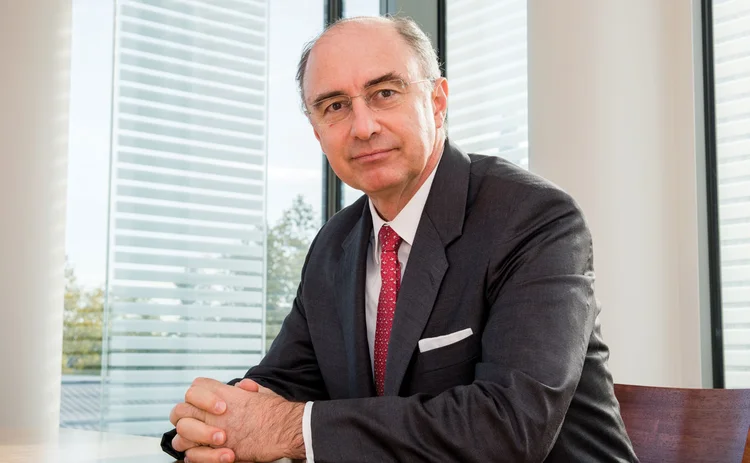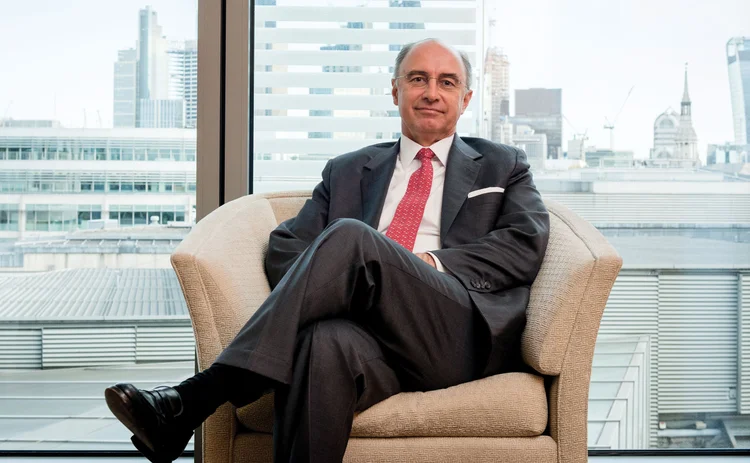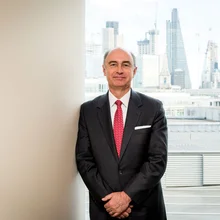
Lifetime achievement award: Xavier Rolet
Risk Awards 2018: Eight-year tenure transformed LSEG, but one big deal got away; exchange now faces Brexit risks and Mifid opportunities

When an activist investor known for trying to oust chief executives goes into battle to save one, it’s worth paying attention.
The chief executive was Xavier Rolet of London Stock Exchange Group (LSEG), the investor was Christopher Hohn of the Children’s Investment Fund, and Hohn ultimately lost. In fact, the revolt may have hastened Rolet’s departure – his plan to step down in 2018 was first revealed in October, then abruptly announced with immediate effect on November 29, the morning after Rolet had received Risk’s lifetime achievement award at the annual ceremony in London.
In his speech, a clearly emotional Rolet told his LSEG colleagues he would miss them. And it’s fair to assume many LSEG shareholders will miss him too. Since the Frenchman took charge in May 2009, the exchange’s share price has risen almost six times over, as Rolet transformed LSEG from a takeover target into an acquirer, picking up 24 firms to diversify the company away from its reliance on UK equity markets, into a global trading, clearing and index business.
That expansion was far from the obvious path in 2009, and Rolet’s plans – presented to investors in September that year – generated immediate scepticism.
“I said to them, fundamentally, the two drivers of growth and value will be intellectual property, namely indexes – and at the time we owned nothing in the space – and balance sheet products – clearing, collateral management – what we call post-trade services. At the time, the only asset we had was CC&G, which was a very small clearing house configured only for the Italian market,” says Rolet.
CC&G came with the 2007 acquisition of Borsa Italiana, which had not yet been fully integrated at the time Rolet took charge. His presentation, he recalls, did not go down well with everyone.
“Many investors at the time thought the best and only strategy for the company was a sort of pump and dump: ‘Cut your costs, your costs are hugely bloated, your technology is poor. We understand if you buy a technology company or change provider, but then cut the costs, and a few months down the line, somebody comes in and puts an offer on the table and we will be happy, we will double our money in six or nine months’,” says Rolet.
His first acquisition didn’t rock the boat: trading technology company Millennium Information Technologies cost just £18 million in what was then war-torn Sri Lanka. At the time, investors didn’t necessarily see the move as significant, he says, although Rolet regards it as a major success.
“[It] was a bit of a feat, because the kind of technology companies we looked at in mature markets had billion dollar plus price tags on them. When we bought Millennium in October 2009, we were desperate; there were outages and a whole bunch of problems with our legacy technology. It took us another year to migrate everything.”

That’s something the team and the company can certainly take pride in – we did what we promised shareholders in 2009, built leadership in post-trade and leadership in intellectual property, in indexes
Xavier Rolet
It also set the pattern for the future, buying at a discount – sometimes a deep discount – to the prevailing valuations in the sector. However, investors were less sanguine about some of the later, larger moves. Rolet points to a 7% fall in the share price when LSEG announced the £450 million acquisition of the 50% of the FTSE indexes business it did not already own, in December 2011.
And yet, in June 2014, the company beat around 100 bidders, including 20 private equity firms alone, to acquire Frank Russell Group for $2.7 billion, with the intention of separating and selling the asset manager while retaining the index business and merging it with FTSE. The combined FTSE Russell index business now has around $15 trillion in assets benchmarked against its products, in developed and emerging markets.
“Having been able to secure this, we were really able to transform our index business from being an also-ran when we just owned FTSE, to being a global leader. That’s something the team and the company can certainly take pride in – we did what we promised shareholders in 2009, built leadership in post-trade and leadership in intellectual property, in indexes,” says Rolet.
Compression success
The key transformation to achieve his other strategic goal – expansion into post-trade services – was the acquisition of a 60% stake in LCH for €328 million ($386 million). The deal was announced in 2012, and completed in 2013. With European regulation of central counterparties (CCPs) changing while the deal was thrashed out, LCH agreed to raise an additional €320 million from shareholders to boost its regulatory capital, including €185 million from LSEG.
The whole transaction initially sparked concern among LSEG shareholders, according to Rolet. At the time, the prevailing consensus was that cross-margining between over-the-counter derivatives and listed futures would see clearing of OTC products migrating to futures exchanges such as CME and Eurex. The rising pressure of minimum margin requirements under the European Market Infrastructure Regulation (Emir) and US Dodd-Frank Act were prompting much prognostication about the ‘futurisation’ of the remaining OTC derivatives market.
“Many of our shareholders were concerned – they thought we were buying an underperforming company with lots of operational issues, whose only business left was OTC clearing. The question was, ‘Why are you paying all that money for a platform that is dying operationally and is on the wrong end of the future direction owing to Emir, Dodd-Frank and the benefits of cross-margining between listed and OTC?’” says Rolet.
He took a different view. With OTC interest rate volumes outweighing the futures business, the tail would not wag the dog – Rolet was convinced the efficiencies on offer within the OTC market would outweigh the untested promise of cross-product margining.

Even though we had just bought LCH, we invested tens of millions in a new programme called compression, which is the reason why that business around the world – in Asia, Europe and the US – actually moved to LCH
Xavier Rolet
“If we could compress within OTC, across currencies, across blended rates, single rates and so on, the benefits in terms of risk reduction, and of course the ensuing benefits to clients in terms of regulatory capital reduction, would be huge. So, even though we had just bought LCH, we invested tens of millions in a new programme called compression, which is the reason why that business around the world – in Asia, Europe and the US – actually moved to LCH. The opposite of the analyst consensus is what happened,” he says.
He attributes the success of LCH in part to a key element of his essential philosophy for the group: client involvement in the governance of the post-trade services it operates. “In 2016, LCH’s Swapclear customers saved $25 billion of regulatory capital thanks to the compression service, so of course they don’t mind paying for it, and in fact they helped us build it, by telling us what they really needed,” says Rolet.
LCH now has as much as 90% of OTC derivatives clearing market share. Its inflation swaps business is taking off, and its credit derivatives service is also growing. Over the same period, CME has launched but later shuttered both inflation and credit swaps clearing, while Eurex has so far failed to make a dent in the interest rate swap business.
Access all areas
Closely associated with the client-led governance is another aspect of the group’s approach that Rolet is especially keen to protect: the open access provision of all its services. He says rivals originally “derided” it, but he is confident it will ultimately prove the only viable model.
“If I told you the only way you could be insured, whether it’s unemployment, mortgage, life, travel or sickness insurance, that the only way you could secure these products is through a single provider for a single fee, you would say sorry, not today, in the age of internet,” says Rolet.
This means, for example, Franklin Templeton building exchange-traded funds based on FTSE Russell indexes, and trading them on the New York Stock Exchange. Or CME clearing FTSE Russell futures, and cross-margining them with S&P500 futures.
“If you bundle all your services, access to your IP, your indexes, clearing, your trading, your settlement, in a single product, for which of course you charge a bundled fee, and don’t give choice to your customers, they do not like that model,” he says.
Increasingly, there are signs regulators and policymakers support Rolet’s stance on transparency and open access.
[What] has been forgotten but was very important for us, and not just for political reasons – our legal domicile and our topco would have remained in the UK
Xavier Rolet
The EU’s second Markets in Financial Instruments Directive and its accompanying regulation (Mifid II) include extensive open access provisions, such as unbundling the trading and clearing of listed derivatives. He says during the merger talks with Deutsche Boerse in 2016, he extracted a public pledge from Carsten Kengeter, the German firm’s then-chief executive, that LSEG’s open access practices would be adopted across the combined group once Mifid II came into force in January 2018.
One that got away
The eventual failure of the Deutsche Boerse deal in February 2017, is perhaps the most significant setback in Rolet’s career at LSEG. The proposed merger became caught up in the uncertainty fuelled by Brexit, leading to sensitivity in the UK that a crown jewel was being “sold” to a German buyer. Rolet was ready to stand down as chief executive of the combined group in return for one key concession that would have ensured the deal was not a German takeover.
“[What] has been forgotten but was very important for us, and not just for political reasons – our legal domicile and our topco would have remained in the UK. People sometimes say we were selling: you don’t sell yourself if your legal domicile remains where it is. This is important not just for political reasons, but most importantly for our client governance, our partnership model, our open access model,” he says.
He stands by the logic of the deal, which he says would have “seen the emergence of the most competitive, the most global, most fully diversified exchange in the world”. Ostensibly, the merger failed when the European Commission competition directorate ordered LSEG to sell the Italian bond trading platform MTS, which it had acquired in 2007. MTS is the leading venue for Italian government bond trading, and LSEG management had assured the Italian government the platform would not be sold. However, Rolet does not see this as the real reason for the EC’s effective veto on the Deutsche Boerse merger.
“We came very close to success. In fact, the commission had indicated they were minded to clear the deal. An extraneous event happened, which had nothing to do with LSEG or me personally, which effectively killed the prospect of the deal, but I think we were very close and were about to secure a deal. But it didn’t happen, because something else happened the same day,” he says.
One event that happened that day – February 1, 2017 – which Rolet understandably is unable to discuss, was the launch of an insider trading investigation against Kengeter. It led to his eventual resignation as Deutsche Boerse chief executive in October 2017, after a German court rejected a fine and settlement the company had reached with the German authorities.
A year of change
The interim chief executive of LSEG, former chief financial officer David Warren, now faces a year of opportunity and risk in 2018. The opportunity comes from Mifid II, which is intended to strengthen the role of trading venues in European financial markets. Rolet says LSEG and its members are as ready as possible for January 3, and have undertaken test runs on weekends. But some smaller buy-side clients, and perhaps even a few of the larger ones, are still racing to comply.
In terms of the advantages for LSEG, the first is the group’s existing commitment to open access, which aligns with the ethos of the new trading regime. He thinks LSEG can break into the bundled markets of competitors – Ice’s control over trading in Euribor, or the monopoly Deutsche Boerse enjoys for trading Eurostoxx.
“In the pharma industry, if you applied these rules, you could only buy aspirin from Bayer. After a time, when you own an index that has been developed, it becomes of generic value. Why should you be able to restrict the trading of an index to the company that owns the index itself? There should be competition. So that’s the principle embedded in Mifid II that is going to be very favourable,” he says.
In addition, he expects Mifid II best execution requirements to force buy-side firms to diversify the trading venues they use, to prove they are considering all possible execution channels. That could benefit CurveGlobal, the derivatives trading venue launched jointly with a number of dealers in 2016.

Turquoise is the only exchange-operated platform in the world in equities that has governance involving both buy-side and sell-side
Xavier Rolet
Rolet also believes Turquoise, the equity dark pool whose acquisition he oversaw in 2010, is well placed to benefit from the Mifid II trading obligation. This ushers in a dark pool double volume cap: 4% of the total volume in one stock traded on one dark pool for a period of 12 months, and 8% of the total volume of a stock traded on all EU dark pools for a six-month period.
Depending on the limit an individual stock breaches, either an individual dark pool has to suspend trading in the stock – for the 4% cap – or all EU dark pools must suspend trading in the stock – for the 8% cap – for a period of six months.
There is a waiver from these caps for large-in-scale trades – blocks that would cause a significant price impact if they traded on lit venues, causing hedging problems for intermediaries handling the trade. And this is where Turquoise comes into its own.
“Turquoise is the dark pool with the largest average transaction size in Europe, which far exceeds the thresholds under which dark trading limitations come into force. We think that platform is exceedingly well positioned. It is the only exchange-operated platform in the world in equities that has governance involving both buy-side and sell-side. We take pride in this, and it is the reason why this platform has been so successful in terms of block trading,” says Rolet.
Fragmentation threat
However, the major risk of 2018 could undermine all these opportunities: Brexit.
“This year, we are going to clear, trade and settle about a quadrillion dollars of securities and notional contracts. This is one of the largest global financial systemic complexes in the world, so one wants to continue to run that effectively, if possible without any distractions unrelated to business or competition,” says Rolet.
That looks a forlorn hope. Already, German lawmakers are calling for the EU to review the Mifid II application of Rolet’s precious open access principles, in light of the departure of some of Europe’s largest trading venues from the single market.
And LCH is at the heart of one of the most high-profile financial sector tussles over Brexit, as the EC mulls allowing the European Central Bank and European Securities and Markets Authority to impose volume limits for third-party CCPs clearing derivatives on behalf of European market participants. Above those thresholds, the CCP might potentially have to relocate and submit to full EU supervision.
You cannot manage risk on a national basis, it is absolutely impossible under any scenarios
Xavier Rolet
Rolet says LSEG will continue to engage with policymakers on “this big debate” about market fragmentation. He is heartened by what he says are recent signs the EC is prepared to consider enhanced co-operation between EU and third country supervisors as an alternative to outright relocation. To provide reassurance to the US authorities, there is already a co-operation agreement between the Bank of England and the Commodity Futures Trading Commission governing supervision of LCH and its 90%-plus share of interest rate swap clearing. He sees “no reason” why the same arrangement should not work for the EU.
He also maintains that 75% of euro-denominated transactions cleared at LCH originate from institutions outside the EU. And he notes the contrast between the attitudes in Europe and those in China, which is comfortable with LCH clearing renminbi transactions even though the currency is not yet fully convertible.
“If the EU becomes protectionist, then it means several things. They will get poorer, faster. The euro will never be a global reserve currency – you cannot have a global reserve currency if you put up protectionist barriers and say you can only clear the euro inside the euro area. You cannot manage risk on a national basis, it is absolutely impossible under any scenarios. Of course, you have regulators who have powers and can intervene, but the interconnectedness of flows and investments means you have to work with others,” says Rolet.
Foreign legion
Hearing Rolet speak about Brexit, it is clear he feels the impact as much personally as on the company he managed. The Frenchman who led a British national champion for almost nine years is in some ways the living embodiment of the single market. And an international perspective is part of his heritage: his paternal ancestor, Paul-Frédéric Rollet, was the general in charge of the French foreign legion in the early twentieth century.
After following the family tradition with a spell in the French air force, his appetite for an overseas career took him to Goldman Sachs in New York in 1984, working on the international equity arbitrage desk. Whatever its strengths, at that time emerging markets coverage was evidently not one of them: rival Morgan Stanley led the charge into emerging market equities with the creation of MSCI.
In the absence of a Spanish speaker on the New York trading floor, Rolet was called on to handle several major Mexican privatisations on the trading side. When he joined Credit Suisse First Boston (CSFB) in 1994, he found a very different environment.
“CSFB already had a deep infrastructure in Russia, a presence in Asia. I really discovered the frontier markets at the time; I spent a lot of time in Russia, Eastern Europe, at a time where the voucher privatisation schemes started in 1994. It was really the Wild East. That opened up a range of experience I found useful in my later career.”
His tenure at LSEG was marked by its success in attracting initial public offerings from emerging markets, both large and small. The exchange boasts 50 technology relationships around the world, and Rolet proudly displays a 2017 report compiled jointly with the African Development Bank and other partners, entitled ‘Companies to Inspire Africa’. He also created the Elite private equity programme, designed to work as a pre-IPO accelerator and fundraiser for small and medium enterprises, which now operates across 28 countries as varied as Morocco, Israel and Ukraine, with a growing partnership in China.
It is time governments in Europe reduced the unacceptable burden they have laid on equity markets
Xavier Rolet
Elite in particular means more to him than just business. He sees equity as part of the answer to one of the questions posed by the Brexit vote: how to restore confidence in free trade and capitalism if people are short of capital.
New bank regulation that constrains balance sheets intensifies the imperative he believes was already there before the financial crisis. That is, to wean Europe off its 80% dependence on bank debt financing that creates excessive leverage in the financial sector and short-termism among entrepreneurs.
“Those SMEs were telling us: ‘Our problem is I am growing at 50%, 60% per annum, I don’t have access to long-term capital. The banks don’t want to lend to me, or they lend, [but] I’ve got to repay the loan every month, it forces me to be short-term in my cash generation; I cannot invest in my export markets, I need a long-term investment where somebody takes the substantial upside in return for me being able to plan the next two, four years my investment, my export drive’,” he says.
His parting shot is a call for policymakers to reverse the historic fiscal preference for debt over equity, by reducing the tax deductibility of debt interest payments – or eliminating it altogether above a certain leverage threshold – and scaling back the plethora of taxes on equity, including capital gains, dividend and financial transaction taxes such as UK stamp duty.
Given his success in diversifying LSEG so that it now trades and clears everything from government bonds to credit derivatives, this feels like a lot more than just a final piece of corporate lobbying on behalf of a stock exchange.
“On a present value at the time of issuance, the cost of a debt investment before any returns is negative 6% in the EU, whereas the net fiscal cost before any returns of an equity investment is positive 34%. There is a 40% fiscal delta on average between a debt versus an equity investment. Are we surprised our economy crashes regularly because there is too much debt? If you want to fix this, it is time governments in Europe reduced the unacceptable burden they have laid on equity markets, to help recalibrate our economy towards an entrepreneurial economy that can benefit all citizens,” he says.
Once his gardening leave has ended, don’t be surprised to find the man who diversified LSEG going back to his equity-raising roots.
Only users who have a paid subscription or are part of a corporate subscription are able to print or copy content.
To access these options, along with all other subscription benefits, please contact info@risk.net or view our subscription options here: http://subscriptions.risk.net/subscribe
You are currently unable to print this content. Please contact info@risk.net to find out more.
You are currently unable to copy this content. Please contact info@risk.net to find out more.
Copyright Infopro Digital Limited. All rights reserved.
As outlined in our terms and conditions, https://www.infopro-digital.com/terms-and-conditions/subscriptions/ (point 2.4), printing is limited to a single copy.
If you would like to purchase additional rights please email info@risk.net
Copyright Infopro Digital Limited. All rights reserved.
You may share this content using our article tools. As outlined in our terms and conditions, https://www.infopro-digital.com/terms-and-conditions/subscriptions/ (clause 2.4), an Authorised User may only make one copy of the materials for their own personal use. You must also comply with the restrictions in clause 2.5.
If you would like to purchase additional rights please email info@risk.net
More on Awards
Market data provider of the year: S&P Global Market Intelligence
S&P Global Market Intelligence has consistently met demands across Apac’s fast‑evolving capital markets, securing its win at the Risk Asia Awards 2025
Best user interface innovation: J.P. Morgan
J.P. Morgan wins Best user interface innovation thanks to its Beta One portfolio solution
Market liquidity risk product of the year: Bloomberg
Bringing clarity and defensibility to liquidity risk in a fragmented fixed income market
FRTB (SA) product of the year: Bloomberg
A globally consistent and reliable regulatory standardised approach for FRTB
Best use of cloud: ActiveViam
Redefining high-performance risk analytics in the cloud
Best use of machine learning/AI: ActiveViam
Bringing machine intelligence to real-time risk analytics
Collateral management and optimisation product of the year: CloudMargin
Delivering the modern blueprint for enterprise collateral resilience
Flow market-maker of the year: Citadel Securities
Risk Awards 2026: No financing; no long-dated swaps? “No distractions,” says Esposito







